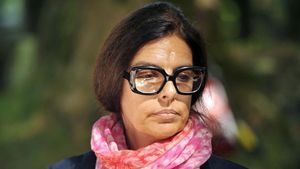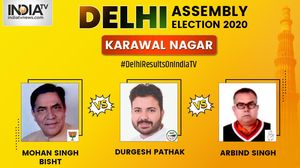New Delhi has been the focal point of the 2025 Delhi Assembly elections, with intense competition as voter responses are being tallied for the key New Delhi constituency. Aam Aadmi Party (AAP) chief and former Chief Minister Arvind Kejriwal is facing significant challenges from Bharatiya Janata Party (BJP) candidate Parvesh Verma and Congress’s Sandeep Dikshit, the son of the previously long-serving Chief Minister Sheila Dikshit. The stakes are high as this election will determine if AAP can maintain its governance for a fourth consecutive term or if the BJP can stake its claim to power after nearly three decades of absence in the region.
According to the Election Commission, New Delhi recorded a voter turnout of 56.41% during this election, reflecting the intense interest among the electorate. Counting began at 8 AM on February 5, with live updates indicating tight margins. Verma initially took the lead, with Kejriwal trailing by approximately 1,844 votes according to early reports. Such developments point to the possibility of AAP not being able to retain its stronghold on this pivotal constituency, which has been under its leadership since 2013.
The historical significance of the New Delhi seat cannot be overstated; it has been represented by Kejriwal since he first won against Sheila Dikshit with a sizable margin of over 25,000 votes. This victory marked what many regarded as a seismic shift in Delhi politics. The dynamics are now altered with the BJP ramping up its efforts to overturn this dominance, as they have lacked representation here since 1977 and are eager to send strong political signals by claiming victory.
Sandeep Dikshit, representing the Congress, is also another key player. His campaign strategy focused on grassroots engagement, leveraging his mother’s legacy to reconnect with Delhi voters. He previously served two terms as MP and now aims to reclaim the Congress’s lost ground, particularly after suffering total defeats in previous Delhi elections.
Political analysts note the challenges Kejriwal faces are compounded by allegations related to the infamous liquor scam currently swirling around him. Recently, Kejriwal found himself under scrutiny as the Supreme Court temporarily restricted him from accessing government files, leading many to question the outcome of his campaign.
Political reaction has been fervent. Reportedly, Congress's Sandeep Dikshit conceded during the counting process, acknowledging trends suggestive of BJP forming the government. “We raised the issues, but I think people thought we were not going to form the government. We accept the decision of the people,” he expressed.
Opposition leader and BJP candidate Parvesh Verma, commenting on this, stated, “All exit polls are indicating a clear win for BJP.” His confidence seems well-founded, exhibiting the sentiment of voters eager for change. Meanwhile, Kejriwal’s allies have expressed optimism, maintaining trust in their candidate’s proven track record and promising policies.
The AAP’s prior electoral successes cannot be overlooked; they achieved historic victories with 67 seats out of 70 following the 2015 elections. Their unwavering momentum continued with 62 seats during the 2020 elections, when the BJP made slight gains from three to eight seats but remained well behind AAP’s dominance.
With the backdrop of this electoral drama, the strategies from both BJP and Congress have been remarkably different. The BJP sought to focus on local issues, including the city’s infrastructure, corruption, and citizen grievances, as noted by party leaders who criticized AAP’s governance. Meanwhile, Congress's effort has revolved around rekindling the voters' emotional connection to Sheila Dikshit’s legacy.
All eyes remain locked on the results, anticipating whether historical trends will repeat themselves or if voters will lean toward new faces and promises, reflective of their grievances experienced under longstanding regimes. The outcome from New Delhi’s assembly elections will be pivotal, not just for the candidates currently competing but for the wider political atmosphere across Delhi.
With every passing round of counting, the whispers of speculation intensify. If Kejriwal pulls off another victory, it could allow him to extend his tenure and solidify AAP's grip. Conversely, if Verma claims victory, it could herald the downfall of AAP's reign and transfer significant power dynamics to the BJP within the capital.
This multi-dimensional political contest certainly reflects the growing engagement of the urban electorate, whose decisions could shape the future governance of New Delhi. Each party’s strategy, campaign promises, and potential for fulfilling the electorate's disturbing concerns are now on display as the results become clearer.
Whatever the final count divulges, it is evident the political narratives surrounding New Delhi and its assembly elections continue to evolve, making this event not just about numbers but also about the very essence of Delhi's governance and citizen representation moving forward.



